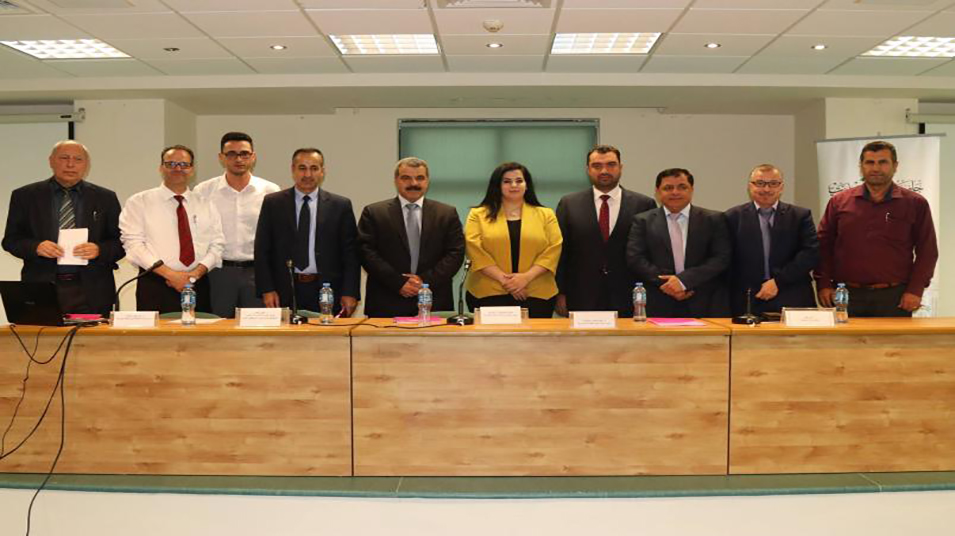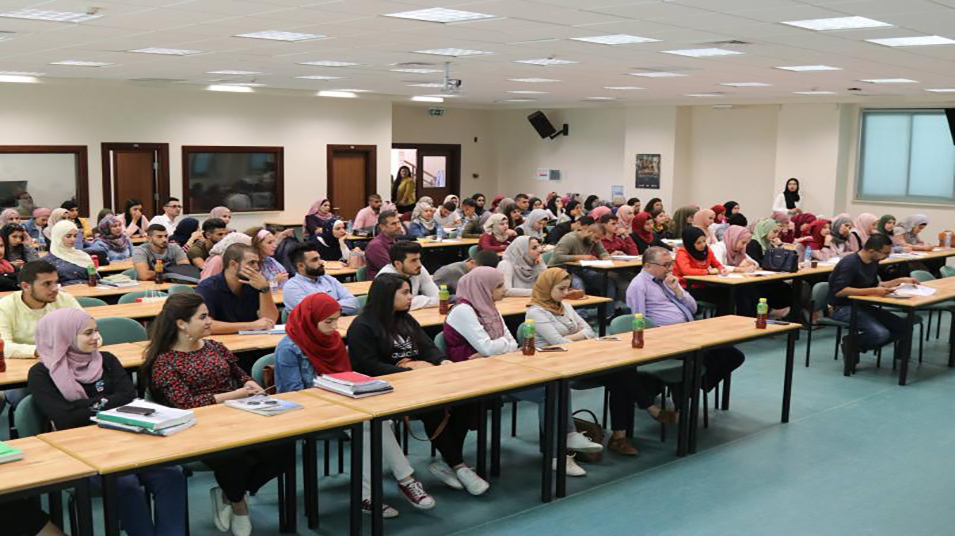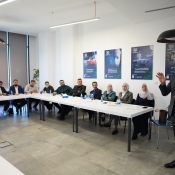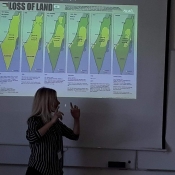Public administration department discusses oversight with regulating bodies in symposium
The Department of Public Administration in the Faculty of Law and Public Administration at Birzeit University has held several recent lectures and symposiums featuring public policy experts in an effort to connect students to officials and give them a glimpse of real-life decision-making.
As part of these efforts, the department recently held a symposium on oversight and evaluation in the Palestinian public sector, on Wednesday, October 24, 2018, entitled “Oversight Agencies in the Palestinian Public Sector: Difficulties and Challenges.”
The symposium featured Fathi Khader, assistant undersecretary of specialized public administration at the General Personnel Council; Iyad Tayyem, president of the State Audit and Administrative Control Bureau; Abdelnasser Abu Samhadana, chief prosecutor of the constitutional and supreme courts; and Farid Ghannam, the Ministry of Finance undersecretary.
Nour Mattour, chair of the Department of Public Administration, highlighted the importance of holding such meetings and events that connect officials and decision-makers to the Palestinian community. She also stressed the importance of oversight bodies in streamlining the public administration process and guaranteeing a high standard of services rendered to Palestinian citizens by governmental institutions.
In his presentation, entitled “The Oversight Organizational Challenges Facing the General Personnel Council,” Khader emphasized the importance of universities in promoting and exploring administrative theory and practice together with the General Personnel Council, citing the recently-signed agreement with Birzeit University to advance cooperation between the two.
Despite the challenges it faces, the public service sector in Palestine is making strides and is comparable to that in many developed countries, said Khader. There have been many advances in public service administration, he noted, such as applying equal opportunity practices and transitioning to an electronic testing service, adding that appointments oversight increased from 68 percent in 2007 to 99.8 percent in 2017.
Along similar lines, Tayyem gave an overview of the State Audit and Administrative Control Bureau and its role in public oversight in Palestine. His presentation, entitled “Challenges Facing the State Audit and Administrative Control Bureau,” focused on the bureau’s role in raising awareness of oversight, especially that the bureau is the highest oversight body according to the Palestinian Basic Law.
The bureau, added Tayyem, provides three types of oversight: financial, performance, and compliance, and aims to guarantee a high standard of services rendered to the public.
Tayyem also addressed the challenges facing the bureau, such as the lack of a legislative body - the Palestinian Legislative Council - the lack of experts and specialists employed by the bureau due to budget deficits, and the large number of public sectors that the bureau monitors.
In his presentation, entitled “Challenges Facing the Constitutional and Supreme Court’s Public Prosecution,” Abu Samhadana discussed the role of the public prosecution in representing state institutions in legal cases filed against it, especially appeals filed against administrative decisions such as hiring and firing.
The constitutional and supreme court’s public prosecution, Abu Samhadana said, reviews the legality, validity, and causes of such decisions. The prosecution’s oversight is limited by law and can only be provided when demanded. The decisions of the supreme court, he added, cannot be appealed or overturned.
Abu Samhadana noted that the challenges facing the public prosecution are the lack of a dual judicial system and that litigation occurs only in the primary jurisdiction level.
Farid Ghannam, who gave the final presentation - entitled “Challenges Facing the Ministry of Finance in Budget and Balance Sheet Oversight” - noted that the ministry monitors financial transactions before disbursement, and audits financial transactions after disbursement.
The main purpose of the ministry’s oversight, Ghannam added, is to monitor positive and negative deviations between what is planned and what is carried out. He also commented that the ministry prepares its budget as per performance-based budgeting, a modern standard that estimates value for money.
Ghannam said that there are supervisors from the Ministry of Finance operating in all other ministries and noted that there is a number of challenges facing the ministry, such as the managers and officials not having adequate financial knowledge, the financial supervisors not being independent nor protected, and decision-makers not accepting financial advice or guidance.
At the end of the symposium, Ismail Iriqat, a professor of public administration at Birzeit University, summarized the presentations, presented the symposium’s final remarks, and gave the floor to questions from the attendees.









